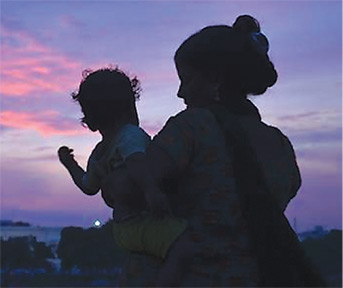Art, dance and music as an Antidote
by Esther Elias
Expressive therapies which involve art, dance and music could help
children cope with trauma, says Spanish clinical psychologist Olga
Martin Anju (name changed) was 17 when she was picked up off the streets
and brought to one of Don Bosco's six centres for the young-at-risk in
Kochi.
At nights though she often wet her bed and her caretakers wondered
why. "This is a classic sign of children who've been sexually abused. In
adulthood they may display poor bladder control," said Spanish clinical
psychologist Olga Martin.
Olga has spent the last four years working with the staff and
children of Don Bosco's Kerala and Karnataka centres through workshops
and training programs that ease trauma in children.
|

Expressive therapies help traumatised children since they
are often unable to articulate in words what they’ve been
through. |
"We see many signs of trauma in the children who join us," says Fr.
Kuriakose Pallikunnel, Director of Don Bosco Youth Counselling Service,
with whom Olga organises these workshops.
"It stems usually from familial dysfunction, an alcoholic parent or
parental separation," he says. Most of Don Bosco's 150-odd resident
children arrived at these centres either after the police found them at
railway stations and other transit points, or through the Child Welfare
Committee's Childline helpline.
Recognising signs
Over the years, Kuriakose notes that while the number of outstation
children found at railway stations has decreased, there is a notable
increase in children from "dysfunctional families, from within the
State, where they have been either physically, emotionally or sexually
abused."
The hot spots for drug peddling, alcoholism and gangsterism are the
same areas from where these children are rescued, says Kuriakose.
Recognising the signs of trauma in young children is the first step
to addressing them, says Olga. "The most obvious signs are often
misinterpreted by caretakers as bad behaviour or indiscipline," she
says.
As a psychologist in Spain, Olga had developed a project that
incorporated many expressive therapies, such as art, dance and music
therapies, that could help children cope with trauma.
A chance meeting put her in touch with Don Bosco's Barcelona wing
through which she was introduced to Kuriakose, who was at the time
looking for someone to boost local centres' mental health programs, and
thus Olga reached Kochi in 2009.
"Many traumatised children are unable to articulate in words what
they've been through," says Kuriakose. "Expressive therapies help them
access these places within themselves, and also give the counsellor a
starting point to work with.
For instance, in art therapy children will invariably draw about
their own lives and the therapist thus enters their inner world," he
said.
In India, Olga set up NGO Street Heroes of India with her friend and
lawyer Marita Sola. One of her earliest workshops taught children how to
raise their self-esteem through various group exercises, develop their
assertiveness, increase their self-motivation and release negative
emotions. She has since brought various professionals from Europe to
work with Don Bosco's staff and children.
Pictures
One of them was a month-long photography workshop by Katherin Wermke,
where children were taught to use basic cameras and collectively, they
created thousands of pictures. Each picture followed a principle - the
child had to reflect on the emotions he/she felt and capture a picture
that would aptly represent that feeling.
"This puts the child in control of his/her moment and they're able to
share without speaking," says Olga.
Another workshop by Natalie Jovanic used storytelling as therapy and
another by Lourdes C. used puppetry. "Both work by enabling children to
access their own stories in the third person, by pretending to tell
someone else's story."
Similarly, dance therapy works especially well for sexually abused
children, by improving their body image and bringing back a
co-ordination between their body and mind, says Kuriakose. "Many
sexually abused children begin hating their bodies and mentally disown
their bodies," says Olga. "Dance builds back their self-esteem."
Over the course of 2014, Olga hopes to bring many more professionals
in art and dance therapy to work with Kochi's children, besides bringing
out handbooks and manuals for staff in the city to continue using once
the workshops close.
"Dealing with mental health issues can be quite a challenge. Training
staff helps them approach children well and workshops with children help
them unlock a variety of positive emotions beyond anger and sadness.
This is as important as their physical and social development," said
Kuriakose.
- The Hindu
|

